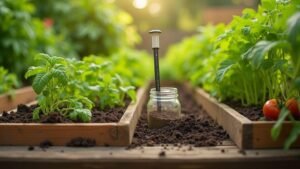Gardening is more than just a hobby—it’s a powerful tool for improving mental well-being. Whether you’re digging in the soil, planting flowers, or simply spending time in green space, gardening offers real psychological and emotional benefits.
In this article, you’ll learn how gardening positively impacts mental health, supported by research and simple ways to integrate it into your daily life.
1. Reduces Stress and Anxiety
One of the most immediate effects of gardening is a reduction in stress levels.
How It Works:
- Exposure to natural environments lowers cortisol (the stress hormone)
- Repetitive tasks like planting and weeding create calming rhythms
- Physical activity releases endorphins
Studies show that just 30 minutes of gardening can significantly lower anxiety and promote relaxation.
2. Improves Mood and Happiness
Being surrounded by plants and flowers naturally uplifts the spirit. Gardening creates a sense of joy through connection with nature.
Benefits:
- Boosts serotonin and dopamine levels
- Encourages gratitude and mindfulness
- Provides a sense of purpose and accomplishment
Even small gardening tasks like watering or pruning can enhance emotional balance.
3. Supports Mindfulness and Presence
Gardening encourages you to be in the moment—observing, touching, smelling, and feeling your surroundings.
Mindfulness Gardening Practices:
- Focus on each breath while planting
- Notice textures, colors, and scents
- Move slowly and intentionally
- Journal your gardening experience
This kind of mindful activity reduces mental clutter and promotes emotional clarity.
4. Encourages Physical Activity
While not as intense as a gym workout, gardening offers steady, low-impact exercise that supports overall health.
Physical Benefits Include:
- Improved mobility and flexibility
- Cardiovascular benefits from digging, lifting, or raking
- Better sleep from daily movement
Exercise is directly linked to improved mental health, and gardening makes it enjoyable.
5. Fosters a Sense of Control and Routine
For many, mental health challenges are worsened by feelings of helplessness. Gardening provides a space where you can nurture life and see real progress.
Routine Helps With:
- Establishing daily structure
- Creating a sense of responsibility
- Celebrating small wins, like a sprouting seed or first bloom
Routines built around care—especially for something living—can be incredibly grounding.
6. Strengthens Connection to Nature
Spending time outdoors reconnects us with the natural world, which is often lost in modern life.
Nature Exposure Has Been Linked To:
- Reduced symptoms of depression
- Lower blood pressure
- Increased feelings of vitality and energy
Just being in a garden can be therapeutic, even if you’re not actively working in it.
7. Builds Community and Reduces Loneliness
Gardening can be a social activity. Whether through community gardens, plant swaps, or gardening clubs, it helps people form positive connections.
Social Gardening Options:
- Volunteer at a local garden
- Join online gardening groups
- Attend local plant fairs or workshops
- Share harvests or cuttings with neighbors
Connection combats loneliness—a major risk factor for mental health issues.
8. Helps Process Grief and Emotional Trauma
Gardening can serve as a gentle, healing outlet during times of emotional pain.
How It Supports Healing:
- Planting in memory of a loved one
- Finding metaphor in growth, decay, and renewal
- Creating a space of reflection and peace
Tending to a living space gives purpose during loss and allows space for slow, natural healing.
9. Boosts Confidence and Self-Esteem
Watching a plant grow under your care reinforces a sense of achievement. Gardening proves that your efforts matter.
Confidence Builders:
- Learning new skills and techniques
- Solving garden problems creatively
- Seeing the results of consistent effort
This confidence often spills over into other areas of life.
10. Supports Mental Health in All Ages
Gardening is accessible and beneficial to everyone—from children to seniors.
For Children:
- Develops sensory awareness and patience
- Encourages responsibility and care
Adults:
- Offers stress relief and time away from screens
For Older Adults:
- Stimulates memory and cognitive function
- Reduces feelings of isolation
Programs that integrate gardening into therapy (horticultural therapy) are growing in popularity and proven effectiveness.
How to Get Started With Mental Wellness Gardening
Even if you’ve never gardened before, you can start small and experience the benefits.
Simple Steps:
- Grow herbs on a sunny windowsill
- Plant flowers in containers on a balcony
- Visit a community garden once a week
- Take 10 minutes to water and observe your plants daily
You don’t need a large space or advanced skills—just a willingness to connect.
Conclusion: Cultivating Wellness Through the Garden
Gardening is one of the most accessible and effective ways to improve mental health. It offers calm in chaos, routine in disorder, and growth during stagnation. Whether you’re planting flowers, herbs, or simply sitting among the green, your garden becomes a place of healing, joy, and self-discovery.
Start wherever you are. Let your garden grow—and let it grow you in return.






